 A moving and timely collection of testimonials from people impacted by hate before and after the 2016 presidential election
A moving and timely collection of testimonials from people impacted by hate before and after the 2016 presidential election
“Why am I in this country now? Should I move elsewhere? Do I want to raise my kids in this country, where hate is so visible and rampant? I’ve been in this fight for decades, but even I struggle. Deep down, though, I know we need to stay the course and continue the fight.” —Marwan Kreidie, after a pig’s head was thrown at the Al-Aqsa Islamic Society Mosque in Philadelphia
In American Hate: Survivors Speak Out, Arjun Singh Sethi, a community activist and civil rights lawyer, chronicles the stories of individuals affected by hate. In a series of powerful, unfiltered testimonials, survivors tell their stories in their own words and describe how the bigoted rhetoric and policies of the Trump administration have intensified bullying, discrimination, and even violence toward them and their communities.
We hear from the family of Khalid Jabara, who was murdered in Tulsa, Oklahoma, in August 2016 by a man who had previously harassed and threatened them because they were Arab American. Sethi brings us the story of Jeanette Vizguerra, an undocumented mother of four who took sanctuary in a Denver church in February 2017 because she feared deportation under Trump’s cruel immigration enforcement regime. Sethi interviews Taylor Dumpson, a young black woman who was elected student body president at American University only to find nooses hanging across campus on her first day in office. We hear from many more people impacted by the Trump administration, including Native, black, Arab, Latinx, South Asian, Southeast Asian, Muslim, Jewish, Sikh, undocumented, refugee, transgender, queer, and people with disabilities.
A necessary book for these times, American Hate explores this tragic moment in U.S. history by empowering survivors whose voices white supremacists and right-wing populist movements have tried to silence. It also provides ideas and practices for resistance that all of us can take to combat hate both now and in the future.




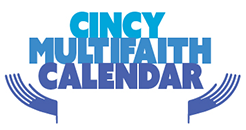
 Sikh American Legal Defense and Education Fund (SALDEF) has also developed a Mental Health Response to Violence Guidebook specifically for community organizations and first responders.
Sikh American Legal Defense and Education Fund (SALDEF) has also developed a Mental Health Response to Violence Guidebook specifically for community organizations and first responders.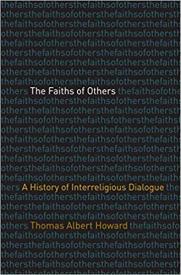 Several questions enliven Thomas Albert Howard’s fast-paced history of interreligious dialogue. Where did the interfaith movement come from? Where is it going? “Rarely in history is something entirely unprecedented,” he writes, so how does interfaith dialogue go from “virtually nonexistent, or rare and episodic at best, in the premodern and much of the modern era . . . to becoming a widely embraced ideal in the twentieth century”?
Several questions enliven Thomas Albert Howard’s fast-paced history of interreligious dialogue. Where did the interfaith movement come from? Where is it going? “Rarely in history is something entirely unprecedented,” he writes, so how does interfaith dialogue go from “virtually nonexistent, or rare and episodic at best, in the premodern and much of the modern era . . . to becoming a widely embraced ideal in the twentieth century”?
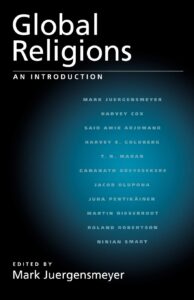 Can Islam be located on a map? Is Europe the center of the Christian world? Is India a Hindu nation? While decades ago these questions were often answered in the affirmative, the truth has never been that simple. Not only are adherents of particular faiths spread across the globe, but there are many variations of a particular faith practiced side by side. This has only become more true in recent years as the pace of globalization has quickened.
Can Islam be located on a map? Is Europe the center of the Christian world? Is India a Hindu nation? While decades ago these questions were often answered in the affirmative, the truth has never been that simple. Not only are adherents of particular faiths spread across the globe, but there are many variations of a particular faith practiced side by side. This has only become more true in recent years as the pace of globalization has quickened.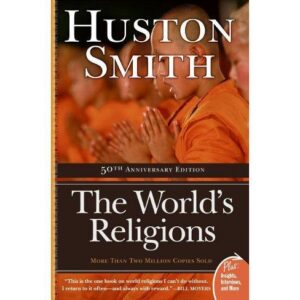 The World’s Religions, by beloved author and pioneering professor Huston Smith, is the definitive classic for introducing the essential elements and teachings of the world’s predominant faiths, including Hinduism, Buddhism, Confucianism, Taoism, Judaism, Christianity, Islam, as well as regional native traditions.
The World’s Religions, by beloved author and pioneering professor Huston Smith, is the definitive classic for introducing the essential elements and teachings of the world’s predominant faiths, including Hinduism, Buddhism, Confucianism, Taoism, Judaism, Christianity, Islam, as well as regional native traditions.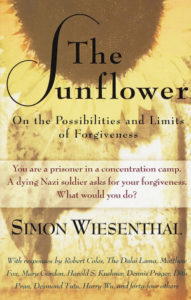 ‘While imprisoned in a Nazi concentration camp, Simon Wiesenthal was taken one day from his work detail to the bedside of a dying member of the SS. Haunted by the crimes in which he had participated, the soldier wanted to confess to–and obtain absolution from–a Jew. Faced with the choice between compassion and justice, silence and truth, Wiesenthal said nothing. But even years after the war had ended, he wondered: Had he done the right thing? What would you have done in his place?
‘While imprisoned in a Nazi concentration camp, Simon Wiesenthal was taken one day from his work detail to the bedside of a dying member of the SS. Haunted by the crimes in which he had participated, the soldier wanted to confess to–and obtain absolution from–a Jew. Faced with the choice between compassion and justice, silence and truth, Wiesenthal said nothing. But even years after the war had ended, he wondered: Had he done the right thing? What would you have done in his place?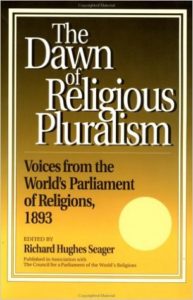 ‘On September 11th, 1893, the Columbian Liberty Bell at the World’s Columbian Exposition in Chicago sounded ten times, symbolizing what were then considered the ten great religious traditions: Hinduism, Buddhism, Jainism, Zoroastrianism, Taoism, Confucianism, Shintoism, Judaism, Christianity, and Islam. One of the most significant events in American religious and cultural history had begun. The ochre robes of Buddhist ascetics, the vermilion cloaks and turbans of Hindu swamis, the silk vestments of Confucians, Taoists, and Shinto priests, the somber garb of Protestant ministers, all gathered together on the platform around a Roman Catholic cardinal, dressed in scarlet and seated in a high chair of state. The near-ecstatic crowd repeatedly burst into tumultuous applause, waving handkerchiefs, and mingling tears with smiles. Nothing like the World’s Parliament of Religions had been seen in the history of the world, and nothing like it was to be seen again for many years: a gathering of representatives of numerous world religions for an exchange of views. It was a turning point in American life, presaging the multiculturalism of a century later. This volume contains a selection of 60 representative and revealing addresses given to the Parliament, with authoritative introductions and notes by Professor Seager. The addresses include contributions by Protestant mainstream ministers, African-Americans, Roman Catholics, Orthodox Christians, Jews, Muslims, Buddhists, Hindus, and representatives of other Asian religions. Also included are various “points of contact and contention, ” in which religious leaders attempted to analyze or reach out to their counterparts in other traditions.’
‘On September 11th, 1893, the Columbian Liberty Bell at the World’s Columbian Exposition in Chicago sounded ten times, symbolizing what were then considered the ten great religious traditions: Hinduism, Buddhism, Jainism, Zoroastrianism, Taoism, Confucianism, Shintoism, Judaism, Christianity, and Islam. One of the most significant events in American religious and cultural history had begun. The ochre robes of Buddhist ascetics, the vermilion cloaks and turbans of Hindu swamis, the silk vestments of Confucians, Taoists, and Shinto priests, the somber garb of Protestant ministers, all gathered together on the platform around a Roman Catholic cardinal, dressed in scarlet and seated in a high chair of state. The near-ecstatic crowd repeatedly burst into tumultuous applause, waving handkerchiefs, and mingling tears with smiles. Nothing like the World’s Parliament of Religions had been seen in the history of the world, and nothing like it was to be seen again for many years: a gathering of representatives of numerous world religions for an exchange of views. It was a turning point in American life, presaging the multiculturalism of a century later. This volume contains a selection of 60 representative and revealing addresses given to the Parliament, with authoritative introductions and notes by Professor Seager. The addresses include contributions by Protestant mainstream ministers, African-Americans, Roman Catholics, Orthodox Christians, Jews, Muslims, Buddhists, Hindus, and representatives of other Asian religions. Also included are various “points of contact and contention, ” in which religious leaders attempted to analyze or reach out to their counterparts in other traditions.’